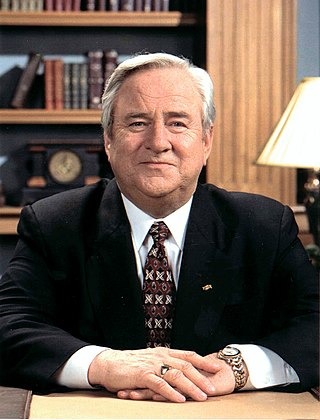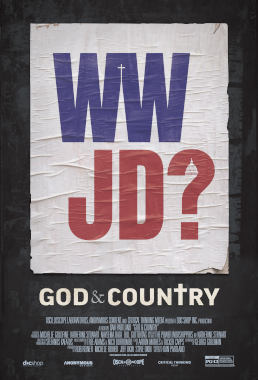Evangelicalism, also called evangelical Christianity or evangelical Protestantism, is a worldwide interdenominational movement within Protestant Christianity that emphasizes the centrality of sharing the "good news" of Christianity, being "born again" in which an individual experiences personal conversion, as authoritatively guided by the Bible, God's revelation to humanity. The word evangelic comes from the Greek word for 'good news'.
The Christian right, otherwise referred to as the religious right, are Christian political factions characterized by their strong support of socially conservative and traditionalist policies. Christian conservatives seek to influence politics and public policy with their interpretation of the teachings of Christianity.

The Moral Majority was an American political organization and movement associated with the Christian right and the Republican Party in the United States. It was founded in 1979 by Baptist minister Jerry Falwell Sr. and associates, and dissolved in the late 1980s. It played a key role in the mobilization of conservative Christians as a political force and particularly in Republican presidential victories throughout the 1980s.

Paul Michael Weyrich was an American religious conservative political activist and commentator associated with the New Right. He co-founded The Heritage Foundation, the Free Congress Foundation, and the American Legislative Exchange Council (ALEC), and coined the term "moral majority," the name of the political action group Moral Majority that he co-founded in 1979 with Jerry Falwell.
The Evangelical left is a Christian left movement in Evangelical Christianity that affirms conservative evangelical theology and are politically progressive. It is mainly based in the US, but is also found in Latin America.
Conservative Christianity, also known as conservative theology, theological conservatism, traditional Christianity, or biblical orthodoxy is a grouping of overlapping and denominationally diverse theological movements within Christianity that seeks to retain the orthodox and long-standing traditions and beliefs of Christianity. It is contrasted with Liberal Christianity and Progressive Christianity, which are seen as heretical heterodoxies by theological conservatives. Conservative Christianity should not be mistaken as being necessarily synonymous with the political philosophy of conservatism, nor the Christian right.

The Root of All Evil?, later retitled The God Delusion, is a television documentary written and presented by Richard Dawkins in which he argues that humanity would be better off without religion or belief in God.
The New Apostolic Reformation (NAR) is a theological belief and movement that combines elements of Pentecostalism, evangelicalism and the Seven Mountain Mandate to advocate for spiritual warfare to bring about Christian dominion over all aspects of society, and end or weaken the separation of church and state. NAR leaders often call themselves apostles and prophets. Long a fringe movement of the American Christian right, it has been characterized as "one of the most important shifts in Christianity in modern times." The NAR's prominence and power have increased since the 2016 election of Donald Trump as US president. Theology professor André Gagné, author of a 2024 book on the movement, has characterized it as "inherently political" and said it threatens to "subvert democracy." Many notable American Republican politicians such as Mike Johnson, Doug Mastriano, Marjorie Taylor Greene, and Lauren Boebert and activists such as Charlie Kirk have aligned with it.
Christian nationalism is a type of religious nationalism that is affiliated with Christianity. It primarily focuses on the internal politics of society, such as legislating civil and criminal laws that reflect their view of Christianity and the role of religion/s in political and social life.
Frederick Clarkson is an American journalist and public speaker in the fields of politics and religion. He is the author of Eternal Hostility: The Struggle Between Theocracy and Democracy ; editor of Dispatches from the Religious Left: The Future of Faith and Politics in America ; and co-author of Challenging the Christian Right: The Activist’s Handbook (1992) for which he and his co-author were named among the "Media Heroes of 1992" by the Institute for Alternative Journalism. They were described as "especially brave at taking on powerful institutions and persistent about getting stories out...journalists and activists who persevere in fighting censorship and protecting the First Amendment," and "understanding the Christian Right's recent strategy of stealth politics early on, and or doggedly tracking its activities across the U.S." He has also published articles with Salon.com, Ms. magazine, The Christian Science Monitor, The Public Eye, and other publications.
Randall Herbert Balmer is an American historian of American religion.
CNN Presents: God's Warriors is a three-part August 2007 CNN Presents documentary produced by Christiane Amanpour in which she examines the rise of religious fundamentalism as a political force in the world. The documentary was filmed in the United States, Europe and Middle East. It focuses on the three major monotheistic religions of the world, Judaism, Christianity, and Islam.

Katherine Stewart is an American journalist and author who often writes about issues related to the separation of church and state, the rise of religious nationalism, and global movements against liberal democracy. Her books include The Good News Club: The Christian Right's Stealth Assault on America's Children (2012) and The Power Worshippers: Inside the Dangerous Rise of Religious Nationalism (2020), which also served as the basis for the documentary film God & Country (2024).

Trumpism is a political movement in the United States that comprises the political ideologies associated with Donald Trump and his political base. It incorporates ideologies such as right-wing populism, national conservatism, and neo-nationalism, and has been described as authoritarian and neo-fascist. Trumpist rhetoric heavily features anti-immigrant, xenophobic, nativist, and racist attacks against minority groups. However some of these claims are debated by those who defend Trump. Identified aspects include conspiracist, isolationist, Christian nationalist, evangelical Christian, protectionist, anti-feminist, and anti-LGBT beliefs. Trumpists and Trumpians are terms that refer to individuals exhibiting its characteristics.

The Trump Prophecy is a 2018 Christian drama film based on a story by Orlando-based retired firefighter Mark Taylor that he named "The Commander-in-Chief Prophecy". It is a collaboration between ReelWorksStudios and Liberty University's Cinematic Arts program, and is the school's second involvement in a theatrically released motion picture after another Christian film, Extraordinary (2017). ReelWorksStudios is owned by Rick Eldridge, who produced the film, and the school's Cinematic Arts department is handled by Stephen Schultze, the film's director.
Exvangelical is a social movement of people who have left evangelicalism, especially white evangelical churches in the United States, for atheism, agnosticism, progressive Christianity, or any other religious belief, or lack thereof. People in the movement are called "exvangelicals" or "exvies". The term prodigals is sometimes used for exvangelicals by people who remain evangelical.
The Seven Mountain Mandate, also Seven Mountains Mandate, 7M, or Seven Mountains Dominionism, is a dominionist conservative Christian movement within Pentecostal and evangelical Christianity. It holds that there are seven aspects of society that believers seek to influence: family, religion, education, media, arts and entertainment, business, and government.

Democratic backsliding in the United States has been identified as a trend at the state and national levels in various indices and analyses. Democratic backsliding is "a process of regime change towards autocracy that makes the exercise of political power more arbitrary and repressive and that restricts the space for public contestation and political participation in the process of government selection".

God & Country is a 2024 American documentary film directed by Dan Partland and produced by Rob Reiner. The film discusses the emergence of Christian nationalism and its close relationship with far-right politics in the United States, exploring its perceived threat to democracy and the politicization of Christianity. The documentary is based on Katherine Stewart's book The Power Worshippers (2020). It is distributed by Oscilloscope Laboratories. The film was released in 85 theaters on February 16, 2024, and grossed $60,464 at the box office.

The Power Worshippers: Inside the Dangerous Rise of Religious Nationalism is a 2020 nonfiction book by American journalist and author Katherine Stewart. The book describes Christian nationalism in the United States as a regressive political ideology with historical ties to opposition to abolitionism in the 19th century, hostility towards Franklin D. Roosevelt's New Deal programs in the 1930s, and resistance to the civil rights movement in the 1950s. Christian nationalists, Stewart argues, falsely believe that America was founded on the Bible and vocally reject the principle of separation of church and state established by the Founding Fathers of the United States, desiring instead to impose their version of theocracy and authoritarianism in its place, often by force.









